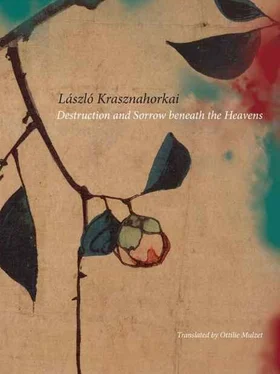So of course they do not find any path leading downward, on the contrary, they become ever-more entangled in the labyrinth of Jiuhuashan; however, on another elevation, next to a lookout pavilion, understandably deserted, they suddenly come upon vendors’ tents, which jump out of the fog so unexpectedly that they nearly recoil. There are rain ponchos and plastic tea flasks but also pilgrimage tote bags, the Amida Sutra[6] printed on artificial silk, Guanyin[7] emblems, rosaries, incense, red wax-paper parasols, books, soya slices, pirated cds and dvds, and what is most important: hot tea, so they are saved, they breathe a sigh of relief, they buy two raincoats, two portable, lidded, plastic tea flasks which they immediately have filled with tea, then they stand beneath the tents so that the rain hardly touches them, and they both take a cup of hot steaming tea; they sip the tea, burning their mouths and their throats, and it is an unspeakably good feeling as it warms them up within a few minutes, as they stand there shivering, the cold finally leaving their bodies, such a good feeling that they don’t even notice each other for a while, and they’re not even bothered that they had to pay twice the going price, they’re in China after all, they brush it off, and they just look at the vendors standing around reluctantly, and clearly sullen because of the bad business, they just look at them, are they earthly beings, or did they suddenly come here from somewhere else. .
They come upon the workshop exactly at that moment when, wandering through the fog at a certain point, they decide to entrust themselves to fate: they will not search for the monasteries they had decided upon, that is hopeless, they will, rather, be content with whatever turns up in their path, and exactly when they are resting underneath the roof of another empty pavilion it’s as if Stein hears something, some kind of hammering, in the distance, he holds up his finger, indicating to his companion to be quiet for a moment, and so they listen to the silence, and then it can be clearly heard, just not continuously, that certain hammering, and they start off immediately, because they can find it! The workshop! Stein enthusiastically shakes the frozen interpreter, it would be so fantastic, just imagine, he tries to breathe some life into the interpreter, the workshop of a Buddha-carver! And here, in Jiuhuashan! Where a workshop like that is exactly the same as it was hundreds and hundreds of years ago, because this is not a place where anything can change, he says, thank God, everything here is so far away from the world, it has remained intact and unspoilt; in a word, he tries to distract the interpreter’s attention from the cold for, really, he is filled with enthusiasm at the thought that this hammering means that they can find the place where that wondrous Shakyamuni was made, so they go on, along the steps, like two drenched chimeras in their rain ponchos, they take a few steps in the direction of the sounds, then they come to a halt because the sound stops, then it starts again, then they hear it again, Stein says it’s from this direction, the interpreter says it’s from the other direction, so that they keep orienting each other among the sounds until, after about half an hour of this ghostly searching, the interpreter, frozen to the bone, runs out of patience, and says, this is exactly the point from where we started off before, and he hears the hammering sound from the same distance as before, and so there is no point to this, he can’t go on, although he is not able to say exactly what his plan would be if he wouldn’t go on, in any event, they sit down beneath the first pavilion they come across a few metres away, they drink some hot tea from the portable tea flasks, they gaze into that great, wondrous, dazzling nothingness all around them, and as they stare into the fog fixedly, well, they see — at a distance still visible from the pavilion, namely, no more than 10 metres to the left, on the side — the entrance of a gate looming in the fog: a gate, says Stein; and that’s it, the entrance to the workshop, the place they had been searching for so much until now in vain, the hammering sound was coming from here, the hammering sound breaking off with those little pauses — the workshop in which someone created that wondrous Buddha underneath the canvas.
To their greatest surprise, the master is a very young and diminutive person, he cannot be more than 30 or 32, and when the interpreter relates who they are and why they have come, and they exchange business cards, he immediately and warmly invites them into his office which is, in reality, more like a little hut attached to the workshop, and he sits each of them down in an ornate armchair clearly kept there only for significant visitors, more precisely, he invites Stein to sit in one while he sits in the other one and the interpreter finds a place on a low kitchen stool next to the mouldy wall, and he offers them tea, and they have to relate in great detail where they have come from, what they want, how much it costs to live in Hungary, the name of which the master is decisively familiar with, indeed, he is already saying that the lifework of Sándor Petőfi[8] is known to every older Chinese, because the great figure of modern Chinese culture, Lu Xun,[9] translated the poem ‘Freedom, Love’, after which others, and with more frequency, tried their luck, so that the result was an apparently complete edition of Petőfi’s works from which every Chinese above the age of 30 can, even today, recite Lu Xun’s translation of ‘Freedom, Love’; as he himself, the master, can too; after which they go on, and they have to say what the population is in Hungary, and they have to disregard the fact that neither he, nor any other Chinese, can believe that altogether it has a population of 10 million, as 10 million is nothing, let alone a people, and no kind of tiny 10 million could have ever produced such a great figure as Sándor Petőfi — or Stein, our host adds appreciatively, Stein, who honours Jiuhuashan with his visit from such a distance, of which, however, the master does have a very vague idea, he says and then he interrogates the interpreter, what is his profession, and after a while he suddenly starts to hem and haw when he hears that László Stein is a poet, and he eyes this László Stein with ever-more respect but also with a kind of searching gaze, he squints, he scratches his beard, then suddenly he is possessed by a kind of cloudless gaiety, like someone overcome by impishness, that all the same — what do centuries and geographical distance mean to him — not only is it the colleague of Petőfi but also Petőfi himself , or as he pronounces it, ‘Peiduofei’, who has popped out of the fog — so that, like a kind of Taoist God, it is Petőfi himself that he greets in the modest person of Stein, who no longer tries to attempt to explain that not only is he not Petőfi but he is also not even a poet — for it is clear from the master’s beautiful, intelligent gaze that he wouldn’t believe him, he would merely attribute it to obligatory modesty and obligatory courtesy, as well as to the high level of secret protection of the visit, mandated from above, so that no more is said about this topic but, rather, to the greatest joy of the guests, the conversation turns to what takes place in this workshop, how long has it been here, whom did the master learn from, and whether he was the creator of that colossal Buddha which the guests now enthusiastically describe. In the meantime, they are thoroughly warmed up by the tea and the lightly heated office, so that it is not too difficult for the interpreter to leave it and go into the workshop, where however it is exactly as cold as it is outside, because there is no heating there, and they don’t even close the door, because the workers are constantly coming and going, so obviously there is no point, yet they have to go into the workshop right away and stay there for a while, because when the master hears their words of praise for his magnificent Buddha, he immediately wants to show his guests, so they can be persuaded with their own eyes that what has pleased them so much was definitely created in this workshop and by his own hands, at which point Stein says to him that it’s not just only the statue pleases them but also that there is a kind of extraordinary strength within it, a kind of radiant power which can only come from the Buddha; the master’s beautiful eyes become veiled, he embraces Stein around the shoulders, he leads him to his own table among the workers and has Stein sit down next to him on a three-legged chair.
Читать дальше












